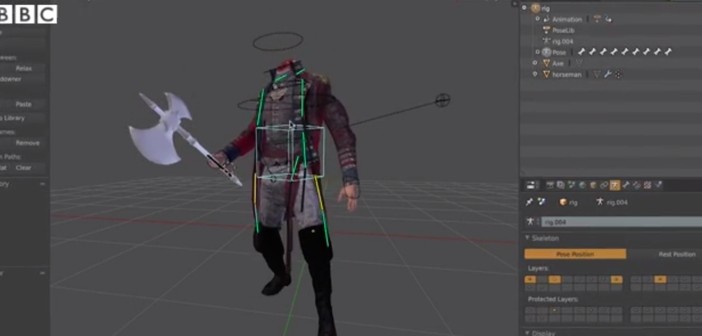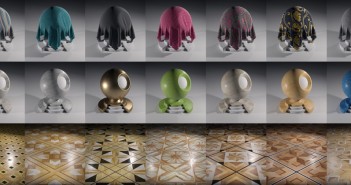It seems that Blender was used in the pipeline of the 'Sleepy Hollow Virtual Reality Experience'. In this BBC item, James Milward talks about VR and Blender makes a quick appearance!
Bad content will 'destroy' the virtual reality industry, says Emmy winner James Milward of entertainment production company Secret Location.
Secret Location recently won an Emmy for their work on the Sleepy Hollow Virtual Reality Experience.
Link
- Emmy winner: Bad content will destroy virtual reality (requires Flash to play the video - here's how I feel about that)





6 Comments
Sweet! You guys beat me to it! We did this project last summer. I used Blender to arrange and light the VR scene, and then baked it down for realtime playback in Unity. Also did various animations like the one shown in the screenshot in Blender (thats my computer screen in the article screenshot! :D)
I use Blender a ton at our company, and its been especially useful for these VR projects. The development branch with spherical stereo rendering has been incredibly useful for making VR videos!
Some other VR projects we've done that heavily used Blender include:
-the Insidious: Chapter 3 VR experience (here's a youtube video of someone going through it: https://www.youtube.com/watch?v=wo2ZrzU5SF8)
-the music visualizations for the Los Angeles Philharmonic VR:
https://www.youtube.com/watch?v=WiHlVPj6i-o
I'll do him one even better here:
A lack of content is what's already making VR a passing fad. Nobody but those who invested in VR googles are the ones interested in the novelty.
I'm constantly seeing people like Epic Games and Autodesk and other giants jumping on the VR train, but I don't see a darn thing to show VR as promising. Kickstarters and other initiatives abound, but thus far, there are no movie, TV or gaming products to date to truly validate the concept of Oculus Rift and Morpheus yet.
All we keep seeing are proposals for the "potential," and tons of enthusiasts, but still tons of shortcomings to be addressed, such as better controls for gaming and cinematic experiences that don't feel like mere gimmicks. I personally like the concept of VR, but I don't see the average person wearing VR goggles, esp. when we're already tamed to the idea of autostereoscopic 3D and such.
I think the only way VR will really catch on with better widespread success (beyond being a mere niche interest with a current few) is when we finally incorporate ease of immersion (that is, no goofy goggles), haptic feedback (that is, experiences that provide some simulated tactile feedback), and content that feels like it's validating the medium, rather than just a mere novelty of the moment (that is, actual games that aren't just merely "for VR" game but experiences rather enhanced by VR).
In other words, the VR industry will have to stop treating VR like some sort of revolution, and start proving it as a capable medium. I think they'll need some real innovation beyond merely making a 360-degree virtual museum out of our games and movies.
As a gamer, I don't even care for VR, personally, because even full-body interaction gets tiring and old after a while, and you just want to go back to good ol' 2D-view gaming.
I and most people wouldn't watch much TV using VR goggles, either, given that I barely watch TV much, and TV's sooner becoming more like an interactive Internet TV than any VR experience.
And I see no real advantage for VR in stuff like office suits (a la HoloLens, which Microsoft has planned) or for everyday life, because it's serving no particular point but sheer aesthetics.
But as a sports fan, personally, I wouldn't mind seeing some virtual "front-row seating," where I can watch a game from a special front-row camera (it'd likely be offered as a pay-per-view sort of thing, but I'd still pay for it). I could also see performance arts such as concerts that could offer special "front-row" seats via VR goggles, which would boost concert revenues significantly.
I think if VR ever has a chance at wider-spread success, it'll have to stop thinking so romantically and start thinking practically. My two cents, anyways.
@BRIAN LOCKETT
"The lack of content is what's already making VR the passing fad ..."
"...All we keep seeing are Proposals for the" potential, ..."
What are you saying?!?!?!?
Virtual reality still in -DEVELOPMENT- phase, many of virtual reality devices are not even avaliable in the market to the final user... (Oculus Rift is in Dev Kit 2, Steam VR in Dev, Sony in Dev... etc)
From what I experienced, as a gamer and programmer....
I saw Smaug, a giant f*&k dragon, a dragon, in my front using VR, and I assure you, it was much more impressive and fantastic than watching on a TV or in the Hobbit movies...
I apologize, im not saying that you need like VR, but I think you should wait and try the final product before having an opinion like "why I think this will not be good" :D
"...Virtual reality still in -DEVELOPMENT- phase, many of virtual reality devices are not even avaliable in the market to the final user... (Oculus Rift is in Dev Kit 2, Steam VR in Dev, Sony in Dev... etc)..."
Yes, and for the past three years or so, you'd think there'd be something by now--even if just in development--to show VR goggles as promising for mass-market success.
What's out there, really? A bunch of simulations that behave more like a virtual 360° museum trips than any next-generation of entertainment. A few games that seem neat for a while, but after a while, you just take the goggles off and continue gaming 2D-style.
For the past three or so years, it's been mostly just early adopters, mainly the indie devs and early testers, to care about VR goggles. So many issues abound, that it'll take years to truly address them, and I don't think the masses are that patient.
For instance, better game controllers is still an issue for VR goggles. Several companies are working on it, but it's still all trial-and-error, as a problem that won't be solved before Oculus Rift's official release.
You also need innovative content unique enough, so that it doesn't start to feel like a one-note fad. Otherwise, the trend declines and people soon drop it.
And then there's the fact that most people don't like wearing glasses/goggles with entertainment. This is what's held 3D gaming/3D TV back all these years. Sure, VR is more immersive than 3D, but is the 360°-view aspect strong enough to make people care for long? So far, even just in projects, I don't see anything with that strong enough promise.
By the way, I'm speaking as both a gamer and a game developer as well. I'm immersed in the game development community, and it is from this very experience I am gaining my opinion.
Everyone and their mom's hoping on the whole "VR gaming" train nowadays, and seemingly everyone's got a "project" now, but not ONE developer thus far has shown anything marketable. Not ONE developer has taken the concept of VR out of its current depths as novelty.
Even Epic Games is putting a lot of effort into VR gaming in UE4, and project after project shows up in the UE4 Forums, but nobody's ever brings anything much beyond neat little novelties to the table.
I've seen nothing yet that proves it as the "next generation of entertainment." I've only seen fans of VR goggles niche, excited about the niche. And I've seen that before in technology. All to no avail.
I remember writing posts many years ago when the resurgence of 3D started. I said it would always be a crap experience while you had to wear glasses to watch any content. Sure enough, manufacturers hardly push the 3D abilities of their TVs anymore (that's if it even supports 3D), customer research shows that 3D is low on the priority list for a large proportion of TV buyers, and most people choose to watch the 2D version of a movie at the cinema.
VR will be just the same, with added expense. Even after the headset has been miniaturised and made fully wireless, it will be a crap experience at home as you crash and smash into your furniture and other people, before running to the restroom to heave. But it might catch on in custom designed warehouse-style amusement venues where you can physically run about in a large open 'set' with other players, much like an indoor paintball environment, while getting the experience of the Star Trek holodeck.
"it will be a crap experience at home as you crash and smash into your furniture and other people"
Not necessarily. This is why I think the Microsoft Hololens has an interesting approach by using 3D scanners and overlaying reality with CG. The form factor is still an issue, I agree.